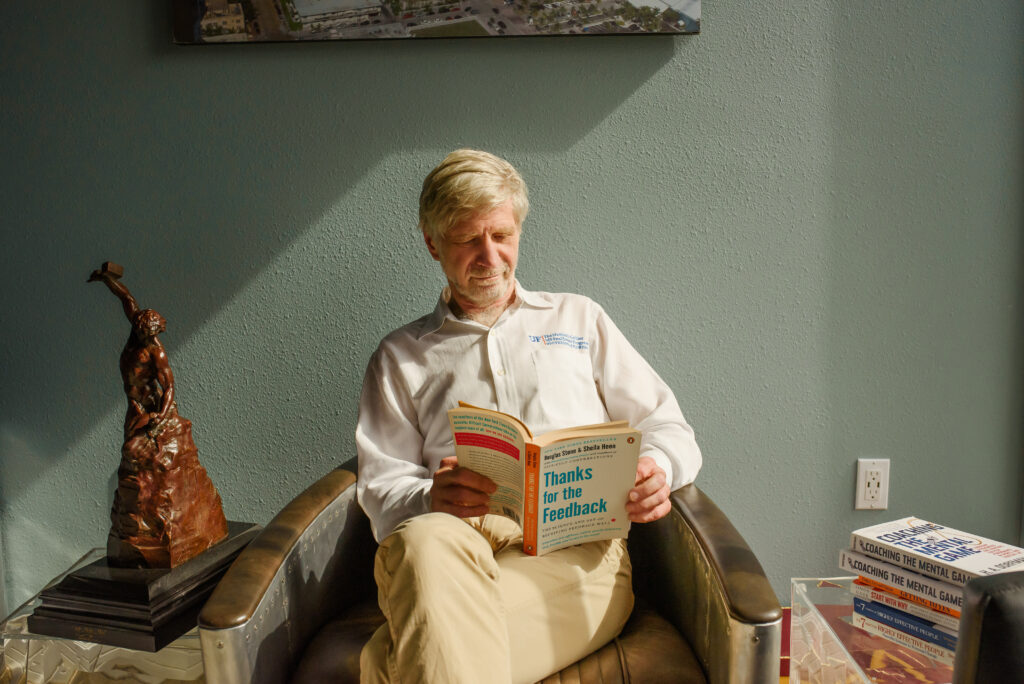Lack of good communication is probably the # 1 reason relationships, personal or professional, get rocky.
One partner or both become uncommunicative, often as a result of a Demand/Withdrawal Cycle.
One partner is not getting what they want or feel they need; other partner perceives demands they feel they cannot or do not want to meet and chooses to respond by withdrawing.
Going Silent is a VERY Dysfunctional Coping Mechanism; it puts the relationship in a vicious downward cycle.
Going silent, ceasing to communicate effectively (i.e. with good intentions and your best heart) is SABOTAGE
Effective communication does NOT include zingers, attempting to score points or engaging in “Ledger Love”
(i.e. holding grudges, keeping score).
A relationship generally creates an obligation to remain in the arena, to continue to engage calmly, effectively OR to be specific/reasonable (i.e. time outs), when one returns
Avoid giving your partner the “Hand in the Face” or “Turning your back”. It’s a huge impact to the Emotional Bank Account
Speak Up! Love does not make someone a mind reade
What we think, from our background and world view, is blatantly obvious can be much less so from another’s perspective
Many sides to every situations, many interpretations of every reality.
Some folks like to process feelings alone verses others that like to talk it out, both legitimate within reason
Balance need to talk to need for space verses disappearing/shutting partner out
Break issues down into baby bites, avoid unloading it all at once.
Do NOT let things build up. Walls form between people a brick at a time. No one brick is insurmountable, the wall can be daunting!
Deliver thoughts with respect, including tone of voice and body language: no sarcasm or eye rolls
In turn, a listener’s shoulder shrug or wandering attention can send a message of indifference
Have the courage to speak your feelings AND to do so before they overwhelm you as stress and resentment
(i.e. bo not bottle your feelings up until you get mad and they burst forth as uncontrolled anger)
Acknowledge fears, yours and theirs
It takes courage and a strong sense of self/safety to open up, it is easy to let yourself feel invaded, pursued, use these feelings as an excuse to run/hide.
Often one partner has feelings of abandonment verses the other partner having feelings of attack, need to self-protection, need for alone time
Ask yourself: Why do I feel this way? What assumptions/interpretations lie behind these feelings? What are the triggers? What behaviors/words/thoughts led me here?
What part do I have in creating this?
Take time outs, go to the balcony/mountain top, practice self-awareness
Learn functional coping mechanisms, good books/courses exist on “Fair Fighting”
Focus on having a dialogue, a discussion; avoid argument framing
Establish rules: Only one partner can be mad at a time and it’s my turn now. Past is out of bounds or no more than 90 days, do not bring up what is beyond the other parties control
“When you do x, I feel y” verse “You make me feel”
Avoid evaluative or judgmental words, they make others feel attacked
(i.e. words like “selfish, rude, uncaring” are likely to be perceived as an aggressive barrage of criticism and trigger a defensive reaction
Am I/We creating the reality we desire?
Acknowledge differences, the importance of meeting/honoring disparate emotional needs
Awareness is key to both the patterns and each participant’s contributions to it and the perspectives of other parties
Take responsibility appropriate for your contribution to the situation without giving a free pass.
Closing Quotes
“Never close your lips to those whom you have opened your heart.” – Charles Dickens
Going silent,
sweeping significant issues under the rug
or giving someone the silent treatment is
corrosive,
destructive,
passive aggressive,
self sabotaging
behavior
that thwarts personal, emotional and spiritual growth.
– Nathan S. Collier
Three VERY Ordinary Rules To Live an ExtraOrdinary Life:
Live Smart
Avoid Dumb
Don’t Sabotage
– Nathan S. Collier





